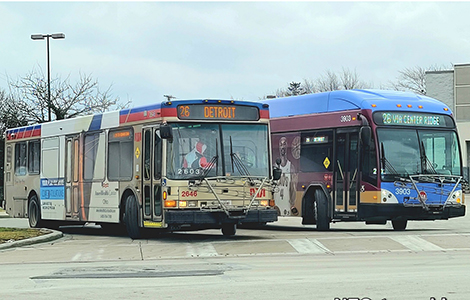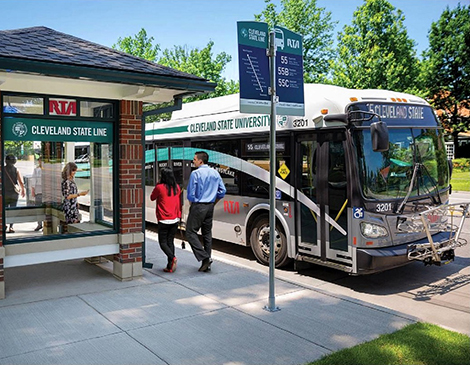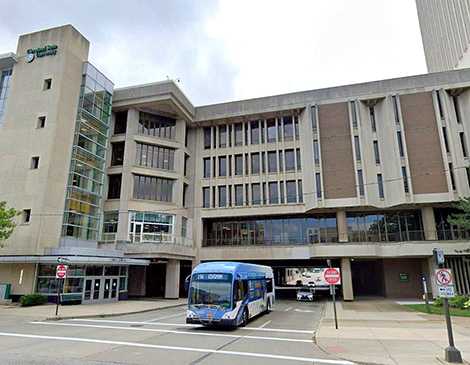The article is published as part of an exclusive content-sharing agreement with neo-trans.blog.
One week ago, Cleveland State University (CSU) notified its students that it was ending its U-Pass that provided fee travel on Greater Cleveland Regional Transit Authority (GCRTA) buses and trains. Today, GCRTA announced that conversations were occurring to continue to offer fare discount benefits to thousands of CSU students.
A GCRTA spokesperson told NEOtrans in a written statement that the conversations with CSU are meant “to identify ways to continue the Universal Access Program (also known as the U-Pass Program) that meets the requirements of both entities.”
The U-Pass is provided in different ways at different universities. At CSU, the U-Pass cost all students $57.50 per semester if they were enrolled in one or more credit hours on CSU’s main campus. Previously, all students were required to pay this amount as part of their tuition whether they took advantage of the discounts offered or not.
Kristin Broka, associate vice president of marketing and communications at CSU, acknowledged that discussions with GCRTA are ongoing. The goal is to identify travel options for CSU students, she said.
CSU has been facing a significant financial crunch in recent years. GCRTA said CSU was recently paying approximately $1.4 million a year to the transit agency.

To address its financial situation, CSU has made significant budget cuts including staff layoffs and cuts to existing programs. Its enrollment has fallen, too, declining from 16,088 in 2019 to about 13,544 last spring semester.
On the morning of July 30, CSU notified students by e-mail that the university had ended the U-Pass program and suggested that they buy GCRTA day, weekly or monthly passes at full price.
That caused strong reactions among online discussion forums like Reddit with some students saying they could not afford to attend CSU without the transit discount.
“I realized that this morning’s message caused concern, especially for those of you who frequently use RTA transit,” said CSU President Laura Bloomberg. “I am truly sorry for the stress this is causing including the unexpected financial hardship caused by the abrupt nature of this change.”
Broka cited regulations defined in House Bill 96 that was passed this summer by the Ohio Legislature, saying it didn’t allow CSU to charge this fee for all students as a part of its billing process.

She said Section 381.270 (B) of the new law specifically states that “Special purpose fees and service charges…shall not be applied uniformly to all enrolled students.”
“While we cannot control the state regulations that impact the student fee structure, we are working internally on options to lessen the immediate financial impact of this for our students,” Bloomberg added. “You will receive further communications regarding these options as soon as we have details available.”
Ohio Gov. Mike DeWine’s office said CSU’s action was a “ridiculous reading” of the law, according to a report. And GCRTA’s statement said “As structured, the U-Pass Program is not an opt-in program. Qualifying criteria for student eligibility for the U-Pass is determined by the participating educational institution(s).”
Case Western Reserve University is continuing its U-Pass program to provide free travel on GCRTA buses and trains. It automatically charges all students a $50 “activity fee” to support the U-Pass program.
Cuyahoga County Community College (Tri-C) also is keeping its U-Pass program. To be eligible, a Main Campus student must have their account paid in full for one or credit hours at Tri-C. Other Northeast Ohio state universities like the University of Akron and Kent State University have U-Pass programs.

Youngstown State University students, like every one else in the Greater Youngstown-Warren-Boardman area, do not have to pay a fare to ride the bus. Western Reserve Transit Authority buses became fare-free during the pandemic and will remain free until at least Dec. 31, 2027.
Broka said CSU has interpreted state law to mean that it cannot assess a transit charge as a student fee. She said it has no other means to bill our students for transit service at this time. Fall semester bills were adjusted to remove this fee from the students’ accounts.
“The U-Pass program was not a profit-making partnership for the university and was never intended as such,” Broka added. “One hundred percent of the student U-Pass fee was paid to RTA. Although a benefit for our students, fewer than half of our student population picked up a U-Pass sticker.”
However, that represents thousands of students. Despite that, Broka said the campus has the parking capacity for “an increase in cars that may result as a diversion from this program.”
“While our discussions are ongoing, a new agreement has not been finalized,” the GCRTA spokesman said. “GCRTA values our relationship with CSU. We will continue to evaluate all available options.”
For more updates about Cleveland, sign up for our Cleveland Magazine Daily newsletter, delivered to your inbox six times a week.
Cleveland Magazine is also available in print, publishing 12 times a year with immersive features, helpful guides and beautiful photography and design.




